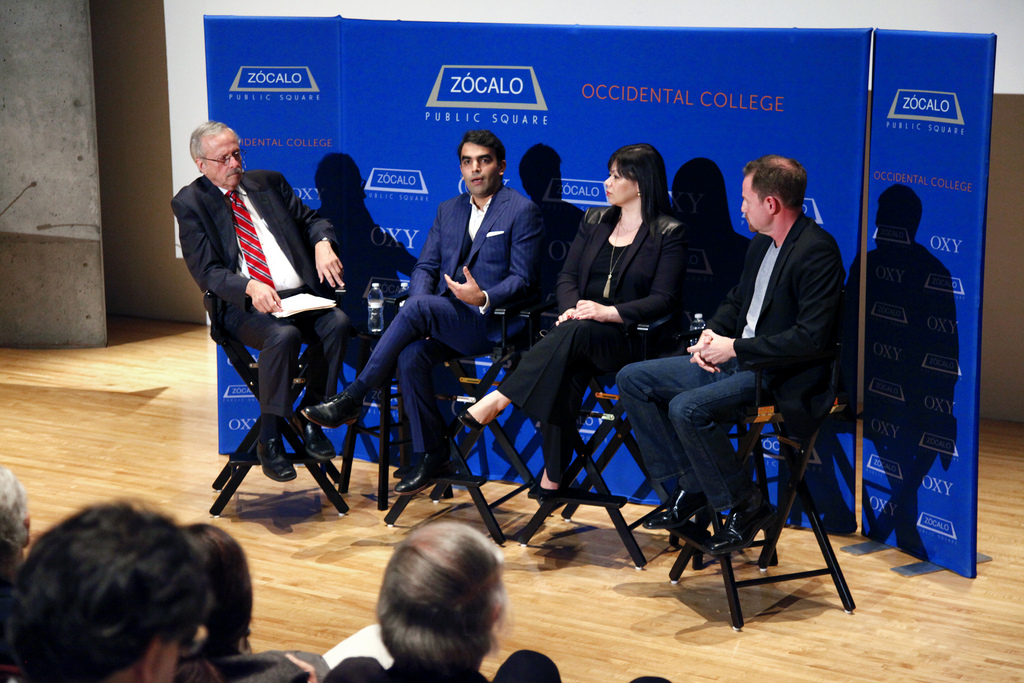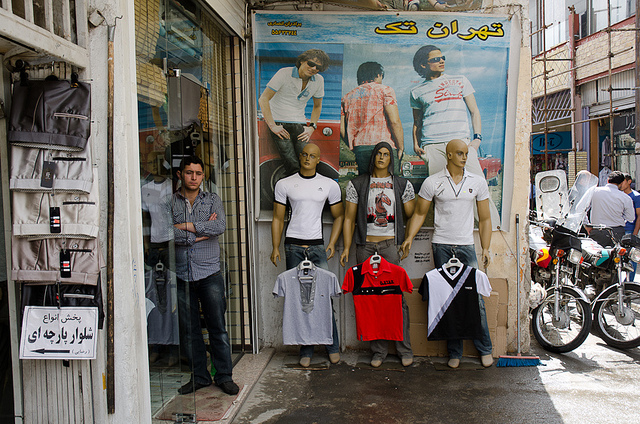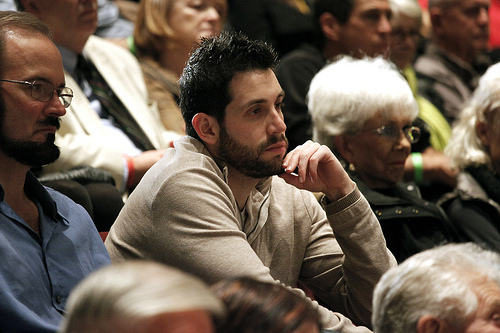
In 1979, George Lewis was an NBC correspondent in Iran covering the hostage crisis. Thirty-four years later and thousands of miles away, at a Zócalo event co-presented by Occidental College at MOCA Grand Avenue, Lewis asked a panel if the breakdown in U.S.-Iran relations he witnessed firsthand might finally be on the road to repair.
U.S. President Barack Obama and Iran’s new president, Hassan Rouhani, have spoken by phone. It appears that Rouhani, a moderate, wants to negotiate and change the two countries’ relationship. Lewis asked the panelists if he has the power and support to do this: Who is really ruling Iran, and do they want a rapprochement?
Occidental College political scientist Hussein Banai, co-author of Becoming Enemies: U.S.-Iran Relations and the Iran-Iraq War, 1979-1988, said that there’s no straightforward answer to this question. Iran’s long-term enmity toward the United States is a separate matter from negotiations over the nuclear issue. “Revolution,” in Iran, “is built on an opposition to western imperialism and arrogance,” said Banai. There is a vested interest within the Iranian regime in keeping the enmity alive.
So, asked Lewis, has anything really changed since 1979?
“We live in a far more transparent world today, and that I think presents a new set of difficulties, not to mention the economic situation” in Iran today, said Banai, which is a tremendous problem.
As vice president of global policy programs at Asia Society, Suzanne DiMaggio has spoken with Rouhani and worked on the upcoming talks in Geneva. Lewis asked her if the U.S. should trust the new president—or if he is, as Israeli Prime Minister Benjamin Netanyahu, claims, a “wolf in sheep’s clothing?”
DiMaggio said there’s no question that the decider is the supreme leader, Ayatollah Ali Khamenei. But Iran’s government is not a monolith; it just might be as complex as our own government, with competing sectors of power and influence, she said. Right now, Rouhani is in a position of power; he was elected with a mandate to improve the economy and improve relations with the West. He has a window, now, to negotiate with the U.S. on the nuclear issue—but that window will not stay open for long, said DiMaggio. “Right now, we really don’t know” if we can trust Rouhani and his team, she said—but they appear to be serious about negotiating, and we must test that seriousness with diplomacy.
Turning to Occidental College historian Thaddeus Russell, Lewis asked him what the new openness of social media and the Internet is doing to Iran.
Russell said that too many conversations about the U.S.-Iran relationship leave out the people of both countries. And many of the 70 million people in Iran are consuming Western popular culture. Last month, 30,000 satellites around the country—many of which stream in the Rupert Murdoch-owned station FARSI1, which airs programs from all over the world—were bulldozed. And according to news reports, Paris Hilton may be more popular than Rouhani. Russell likened the conditions within Iran to those of the late-stage Soviet Union, in which Western culture ultimately inspired people to walk away from a totalitarian regime
But Banai, who grew up in Iran, said that Western culture has been a part of life there since the revolution began—in private, at least. And the regime has known and does know about these activities. They know what the public is consuming; they allow young people superficial freedoms and the enjoyment of lowbrow culture. They crack down on expressions of political dissent and oppositional views. “They’re among the most sophisticated repressive governments in the world,” he said.
Sanctions have devastated the Iranian economy, said Lewis. Rouhani talks about getting the sanctions lifted, but are the sanctions also a tool for blaming internal problems on the U.S.? Does anyone in Iran want to see the sanctions continued?
“No,” said Banai. “Whatever side you’re on, the sanctions destabilize the economy and hurt oil sales.”
And the U.S. should realize, said DiMaggio, that “sanctions can be most effective when they’re lifted.”
Russell added that in the 1990s, President Bill Clinton put sanctions on Iran that included a ban on consumer electronics. If you’re interested in liberating a people, making it illegal to export cellular phones and laptops to them doesn’t seem to be the way to do it, he said. The Obama administration lifted these sanctions in May.
The issues that were obstacles to improving U.S.-Iran relations in the Clinton era have changed, said Banai. Back then, the nuclear issue wasn’t on the table; it was all about Iran’s support for Hezbollah and the country’s human rights record at home. The Islamic regime, he said, should be applauded for finding, in the nuclear issue, a mechanism for changing the conversation from regime change to geopolitics. Iran, thanks to the nuclear issue and two unsuccessful U.S. wars in the Middle East, is once again in its pre-revolutionary position of being at the center of U.S. strategy in the region.
DiMaggio said that for four years, the Obama administration overemphasized the nuclear issue, losing out on opportunities to work with Iran—on Afghanistan, for instance. “I think we’re missing an opportunity now,” she said. “We must bring Iran into discussions on Syria. I’m convinced of that.”
In the question-and-answer session, an audience member asked DiMaggio how Rouhani was received in New York when she hosted him there.
DiMaggio said that while some people were unhappy to have him in New York, most people sensed that he was something different from his predecessor, Mahmoud Ahmadinejad. DiMaggio said that with Ahmadinejad, you’d ask him a question and he’d respond with a question, bombastic and unproductive for hours. Rouhani, on the other hand, is nothing like that. We have to keep in mind that he’s a centrist—a moderate with a clerical background who’s there to preserve theocracy, maybe reform it, but not overthrow it. However, “he had a conciliatory tone and came across as someone quite rational” in New York, she said—noting that “words matter.”
When asked if there was really a chance that Iran would give up its nuclear ambitions, DiMaggio said the answer was no: “I do not foresee the government of Iran giving up their nuclear program, period.” They will not give up their nuclear energy program or the right to enrich uranium on their own soil. But she said that Iran has not yet crossed the threshold toward weaponization, and that the government recognizes that if it crosses that threshold, the consequences would be immediate and swift.






Send A Letter To the Editors